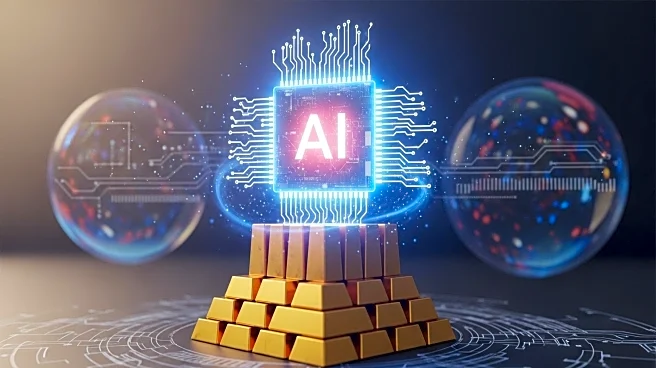What's Happening?
In the first half of the year, spending by companies on artificial intelligence has rivaled consumer spending as a primary driver of U.S. economic growth. This shift highlights AI's significant role in the economy, with concerns emerging about a potential speculative bubble. The stock market has reached near-record highs, driven by technology companies heavily investing in AI. According to the Bureau of Economic Analysis, AI spending contributed significantly to the 1.6% economic growth rate reported for the first half of the year. Despite AI's influence, investments in computers and software only account for about 6% of the economy, compared to 70% for consumer spending. Major tech companies like Google, Meta, Microsoft, and Amazon are projected to spend nearly $400 billion on AI infrastructure this year, impacting various sectors such as energy and construction.
Why It's Important?
The AI investment boom is reshaping the U.S. economy, with potential risks if the bubble bursts. The dominance of tech companies in public markets means any change in their fortunes could significantly impact stock indexes and the broader economy. The 'magnificent seven' tech stocks, including Alphabet, Amazon, and Microsoft, make up about a third of the S&P 500's total value, with their future prospects heavily reliant on AI investments. A downturn in AI spending could lead to reduced revenue for companies involved in data center construction and energy supply, affecting economic growth. Concerns about the sustainability of AI infrastructure spending are growing, with some analysts warning of a potential bubble.
What's Next?
If AI investment proves unsustainable, major tech firms may need to scale back spending, potentially affecting their share prices and the wider economy. A slowdown in data center construction could impact revenue for related industries. Venture capitalists are competing to invest in AI start-ups, driving up valuations, but these companies may need to raise prices to achieve profitability. The Federal Reserve's 'beige book' indicates that AI spending is boosting demand in sectors like electricity and trucking, but a pullback could have widespread economic consequences.
Beyond the Headlines
The AI investment boom is reminiscent of past infrastructure build-outs, such as railroads and internet fiber networks, which initially led to bubbles before proving valuable. The current AI craze may not advance enough to justify the massive investments, leading to potential financial pain. The influence of AI spending extends beyond Silicon Valley, affecting industries across the U.S. If the AI bubble bursts, it could lead to significant economic challenges, similar to previous tech booms.










